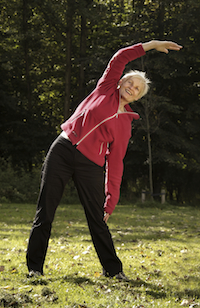 Falls don’t just ‘happen’ and aren’t ‘just part of getting older’. Many people who are older don’t fall, but some do. Most likely this is because they have more ‘risk factors’, that is, things about them that make them more prone to having a fall. Most of these risk factors are ‘modifiable’ and your risk of falling can be reduced with physiotherapy input. Here are the top risk factors for falling that a physio can help you with.
Falls don’t just ‘happen’ and aren’t ‘just part of getting older’. Many people who are older don’t fall, but some do. Most likely this is because they have more ‘risk factors’, that is, things about them that make them more prone to having a fall. Most of these risk factors are ‘modifiable’ and your risk of falling can be reduced with physiotherapy input. Here are the top risk factors for falling that a physio can help you with.
Leg muscle weakness
As we age our muscle strength is harder to maintain than when we were younger. That means we need to put more time and effort into keeping our muscles strong. Added to this, we are likely to be less active as we age, increasing our likelihood of muscle weakness. Fortunately, this is really easy to improve with targeted exercise by a suitably qualified physiotherapist.
Balance
Older people with poor balance are more likely to fall. Sometimes poor balance is attributable to a particular condition, such as Parkinson’s disease or a stroke, but even in these instances, balance can be improved with appropriate exercise.
The way you walk
Walking problems due to pain, weakness, impairments of coordination or balance increase fall risk. Walking very little every day (such as only walking around the house and not outdoors) also increases fall risk. A physio can help someone understand why they have walking problems, help them improve their walking with exercises, and give someone confidence to walk more often and for further. They can also advise on selecting an appropriate walking aid, such as a walking stick or walking frame if needed.
Low blood pressure when standing up
This is called postural hypotension and it is common. It is that ‘light-headed’ feeling we all get from time to time when we stand up too quickly and our blood pressure doesn’t adjust quickly enough. Many things can cause postural hypotension, such as medications and certain medical conditions. However, being less fit can also contribute to postural hypotension. A physiotherapist can help you improve your overall fitness with cardiovascular exercise, which can reduce the symptoms of postural hypotension.
Fear!
People who are afraid of falling avoid activity and become deconditioned. This can very quickly lead to an increase in all of the other risk factors mentioned above through general deconditioning. Developing a plan on how to tackle falls risk factors with a physio is the first step.
If you’re concerned about falling then it’s important that you seek help, use this online Find a Physio tool to find a physiotherapist near you with expertise in falls prevention.
Additional resources:
Physiotherapy Works. The Evidence: Falls Prevention
Visit www.physiotherapy.org.nz for more information, you can also use their Find a Physio tool to find a therapist that is near you.
By Tara Martin
Tara is a member of Physiotherapy New Zealand and a physiotherapist at On the Go Physio.
Tara is experienced working with a range of neurological conditions including Parkinson’s disease, Multiple Sclerosis, Head Injury, Stroke and Spinal Cord Injury as well as general Older Adults health and falls prevention. She is experienced in working with amputees and orthopaedic conditions. She was the first New Zealand Physiotherapist to be certified in LSVT Big (a specialised programme for people with Parkinson’s Disease) and is frequently requested for talks throughout New Zealand regarding her work with people with Parkinson’s Disease.









Join the Discussion
Type out your comment here:
You must be logged in to post a comment.